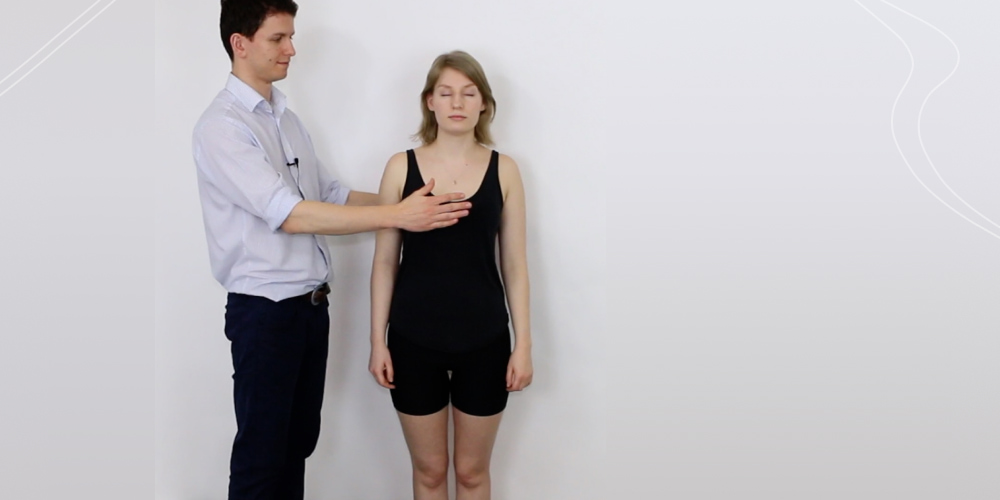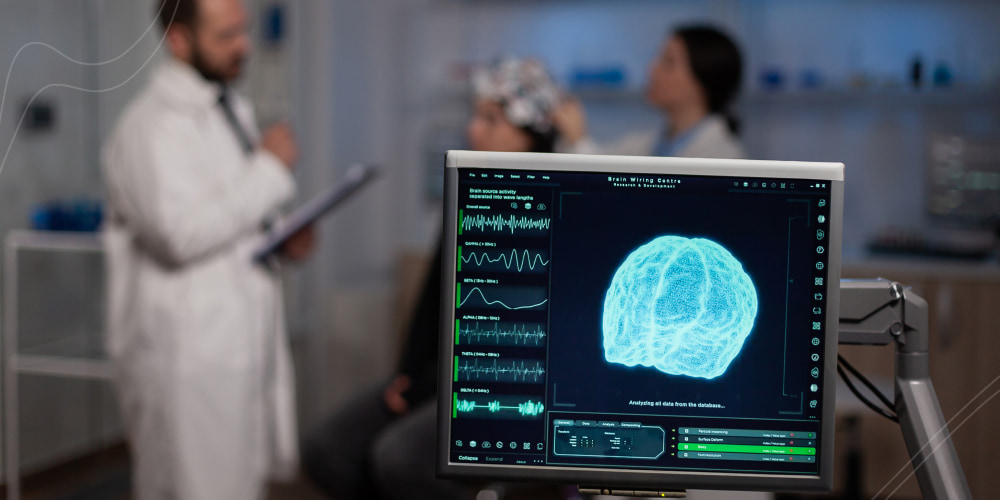The Romberg test is a popular method for testing brain function in neurological medicine. Thanks to it, you can identify various pathologies and diseases.
- This test is used to determine a person’s degree of static Ataxia and their general coordination abilities in space.
- Also, tests are used to determine the degree of drug or alcohol intoxication.
- As a rule, several stages of verification are sufficient to determine the presence of the listed factors.
Additionally, Romberg’s test is used to detect disorders in the body, including the musculoskeletal system. With the help of this technique, it is quite possible to determine a person’s physical fitness quickly.
Ways of carrying out
- The Romberg test refers to the position of the patient with outstretched arms in a standing position.
- First, a person stands with open eyes, after which they are asked to close them. Throughout the test, the specialist does not leave the patient if they start to sway and fall.
- For a healthy adult, it is normal for a stable balance to be maintained for about 15 seconds. A child who does not play sports should stand in this position for 16 to 53 seconds, depending on age (the older, the longer).
If tremor and swaying are observed when using the Romberg method, the patient needs additional examination to prescribe treatment in the future.
Romberg Test as a Tool of Some Disease Detection and the Test’s Varieties
It is used for the following diagnostic purposes:
- cerebellar dysfunctions;
- pathologies of the inner ear;
- central nervous system disorders;
- in cases of spinal cord injury;
- if there are violations of proprioception;
- possible intracranial inflammatory processes;
- other neurological disorders;
- also applies to diagnose sensory Ataxia.
The test allows you to determine whether there are deviations from the nervous system, possible disturbances in the functioning of the brain, and disturbances in the functions of the vestibular apparatus.
In neurology, it is customary to classify this exercise according to the degree of difficulty. Throughout the test, the neurologist observes the patient, assesses the result, and identifies:
- stability or instability and after what time the staggering began;
- the side to which the person falls, losing stability;
- coordination reflex when closing the eyes;
- the presence or absence of limb tremor.
According to this criterion, there are three varieties of the Romberg test. The position of the hands in each of these positions remains unchanged; the pose is complicated by changing the position of the legs.
- Test 1. The patient stands with heels together, arms extended forward, fingers slightly apart. The doctor notes the direction of the swing (left, right, forward, backward) and the time until the swing starts. If the patient does not swing, the doctor asks him to close his eyes to assess his stability without visual control over the balance. The doctor looks at whether Ataxia (staggering) increases when the eyes are closed and whether there is a tremor of the fingers, hands, legs, or trunk, tremor of the eyelids.
During this test, the doctor must always be nearby to prevent the patient from falling if he loses his balance.
The second and third degrees of complexity are used if it is not possible to identify any deviations in a simpler version.
- Test 2 is complicated. The patient stands, heel to toe, arms extended forward, fingers slightly apart. The doctor notes the direction of the swing and the time in seconds before the swing. If the patient does not swing, the doctor asks them to close their eyes to determine how great the influence of vision is to maintain balance and how well other organs cope with this function.
- Test 3 is hard. The patient stands on one leg (to reduce the fulcrum area), and the foot is pressed against the knee of the supporting limb. The patient should hold out for 30 seconds.
Analyzing and Evaluating Romberg Test Results
The doctor evaluates the following characteristics of the Romberg test:
- Stability, the patient standing confidently, or staggers. If swaying appears, after what period does it happen.
- The direction of the patient’s deviation in case of instability matters the person falls to the right, left, or back.
- The condition, in which when you close your eyes and The Ataxia (staggering) worse
- Presence of tremor of the fingers, hands, legs, or trunk or a tremor of the eyelids.
If staggering occurs, the test is considered positive.
For children who are not involved in sports, the norm for maintaining balance in the pose is as follows:
| Age, years | Duration of maintaining balance, seconds |
| 7 | 16 |
| 8 | 21 |
| 9 | 24 |
| 10 | 28 |
| 11 | 30 |
| 12 | 36 |
| 13 | 44 |
| 14 | 48 |
| 15 | 50 |
| 16 | 51 |
| 17 | 52 |
| 18 | 53 |
Unsteadiness in the Romberg position or the presence of tremor may indicate any disease; therefore, if abnormalities are detected, a thorough follow-up examination is required.
Interpretation and diagnostic significance.
- A fall to one side usually indicates a lesion of the cerebellar hemisphere, towards which the person fell.
- Falling backward often indicates a mental disorder or patient simulation. General instability occurs with polyneuropathy.
- False proprioception may also be present.
To reduce false diagnostic moments, one should pay attention to the patient’s patella. They usually do not move during aggravation.
- Whereas a sick person strains the leg muscles when trying to resist, and the patella is displaced upward.
- Several other factors may indicate a patient’s special performance of the test in bad faith.
- Such changes can be objectified using the Romberg test carried out within the framework of the stabilometric study.
Romberg’s position is included in the minimal neurological examination and is a screening method for determining vestibular disorders.
The German neuropathologist Heinrich Romberg first described the diagnostic test in the middle of the 19th century and has since become firmly established in the clinical practice of neurologists, otorhinolaryngologists, and vestibulologists, and general practitioners.
Positive Romberg Test
When summing up the results of the test, the neurologist can identify the type of Ataxia:
- The cerebellar may be associated with diseases of the cerebellum and other parts of the central nervous system.
- Cortical Ataxia is a symptom of any problem in the cerebral cortex.
- Vestibular may indicate that there are problems with the vestibular apparatus.
- Sensitive Ataxia identifies the problem of muscle and joint weakness.
It is almost impossible to diagnose sensory Ataxia or a specific type of Ataxia using a single Romberg test so that other methods can be used additionally.
- If a tremor appears when checking for a stable position in this test, this may indicate problems with the cerebellum, particularly Parkinson’s disease.
- If the neurologist observes eyelid trembling during the application of the Romberg position, this may indicate severe fatigue.
Sensitive Ataxia Symptoms and Diagnosis
Sensitive Ataxia occurs with different clinical presentations, which depend on the level of the lesion. Deviations occurring in the posterior columns of the lower back and chest provoke Ataxia exclusively in the legs. The anomaly, localized in the neck, causes malfunctions in the upper and lower extremities, proprioception. An unilateral lesion of the proprioception zone before the transition of its elements to the other side activates the homolateral form of hemiataxia; symptomatology develops in half of the body on the side where the disorder began.
Sensitive Ataxia is a disease manifested by an impaired sensory sensation of pressure, vibrational responses, and body position in space and proprioception, causing motor failures and discoordination. The characteristic symptoms of an anomaly are:
- a disorder of standard gait and coordination;
- low blood pressure in skeletal muscle regions;
- uncontrolled movements of the distal regions of the arms;
- proprioception.
A deviation from the norm in medical institutions is detected in the presence of specific neurological data.
Diagnosis
- The main diagnostic methods include collecting blood cells for biochemical testing, neurophysiological examination, computed tomography or magnetic resonance imaging of the brain or spinal cord, and genetic tests.
- The Romberg test can also be used for diagnostics.
Sensitive Ataxia Causes
The anomaly is associated with a disruption in the pathways of deep sensory ability. The deviation originates in different regions of the proprioception system (on the back of the spinal cord, ganglia, roots, in the region of the medulla oblongata, thalamus, and cortex).
The disorder is caused by:
- vascular disease (stroke);
- tumor formation;
- cerebral neoplasm;
- multiple sclerosis;
- spinal injury;
- in some moments, sensitive Ataxia appears as a result of a complication reaction after surgery.
Doctors observe the development of the disease in Guillain-Barré syndrome and other types of polyneuropathy (diabetic, alcoholic, infectious-toxic type, etc.). Disorder of the sensation of vibration can provoke symptoms of hereditary anomalies.
Impairment of sensory perception is associated with problems of proprioceptive types of sensitivity, to which doctors refer:
- Musculo-articular reflex, which perceives information about the position of the body in the environment.
- Vibration sensitivity.
- Understanding mass and pressure.
Motor and coordination failures are formed due to the absence or lack of kinesthetic information by the central sections of the proprioceptive apparatus, which provides data on muscle contractions. Sensitive type Ataxia cannot develop on its own; it manifests itself as a symptom complex in neurological disorders. In different situations, the disease progresses depending on the topical nuances of damage to the nerve channels of a proprioceptive nature.
Clinical Recognition of Sensitive Ataxia
A deviation from the norm is characterized by failures in the motor reflex of the patient’s own body.
- Initially, the changes affect gait. The patient puts the lower limbs too wide, excessively bends or overextends them in the knee and hip region, and presses heavily on the ground with the heel. In the medical field of neurology, a similar condition is called a stamping gait. Patients tell their doctors about feelings during movement, such as walking on a cotton pad or sinking. The lack of proprioception of nature can be compensated for by an increased degree of visual ability. Patients often walk with their heads bent forward to see the floor in front of them. In the absence of vision control, the disease is clearly expressed in the curvature of the gait. As a result of this technique, persons diagnosed with sensitive Ataxia find it difficult to move around at night or with their eyes closed.
- The disorder, which developed in the upper limbs, is highlighted by disruptions of involuntary activity and coordination, which cause difficulties in performing daily duties. For example, a patient cannot open a door lock on their own, button a shirt, or have a cup of tea without spilling a drop. At rest, involuntary movements of the fingers of a chaotic direction are noticed, similar to athetosis. Violent activity is caused by a disorder of the subcortical cerebral divisions. The difference is the absence of an increase in symptoms with active gesturing.
Treatment of Sensitive Ataxia
Sensitive ataxia is treated with an etiotropic or symptomatic approach. Patients are prescribed anticholinesterase drugs, vitamin complexes, ATP, massage sessions, etc.
- The first step to getting rid of the patient from disorders is to stop the deviation from the norm. In the case of an infectious pathogen, the appointment of pharmacological components of an antibacterial type will be required. In the case of vascular failures, a vasoactive or hemostatic treatment method is prescribed. A patient with the conclusion of funicular myelosis will need to take vitamin B in a certain dosage. There is a possibility of diagnosing sensory Ataxia with a neoplasm. In this situation, the patient will be offered surgery to remove the tumor.
- Symptomatic therapy aims to maintain stable metabolic parameters in the nervous tissue to increase the degree of resistance to the development of abnormal deformities and the recovery function.
- The neurometabolic course of treatment includes the introduction of ATP, medications like galantamine and vitamin complexes. In addition, the doctor prescribes a visit to therapeutic exercises and massage sessions. Exercise therapy is aimed at improving the coordination of motor abilities through training. Combining exercises with massage significantly strengthens the muscle section.
The further prognosis of doctors is positive when doctors manage to timely eliminate the sources of the development of an abnormal reaction and completely restore the affected area of the proprioception area. The prognosis has a negative outcome for patients with a hereditary type of disorder, tumor formation, and the formation of persistent degeneration processes. In such situations, therapeutic therapy includes inhibition of the development of the disease and effective training of the patient’s motor abilities.
Bottom Line
The psychological state and mood of patients are no less important for recovery and treatment than modern technologies and highly qualified doctors. Lone Star Neurology is one of the leading neurology practices in the United States, TX. We provide our services in Carrollton, Fort Worth, Dallas and other cities in Texas.
Our staff regularly improves their skills: we combine experience and innovation to achieve high results in rehabilitation, and the quality of care at our clinic has always been at its best. In addition, Lone Star Neurology also provides research and education services to patients and families affected by neurological disorders, including ataxia.
FAQ
- When are Romberg coordination tests used?
Romberg’s test is used to determine the degree of static ataxia of a person, as well as his general coordination abilities in space. Also, tests are used to determine the degree of drug or alcohol intoxication.
- How to identify sensitive Ataxia?
A patient with Ataxia syndrome cannot walk fully, falls to the side, and staggers sideways or back. Also, the disease is characterized by wide movements: large steps and a wide range of arms when walking.
- How long do people live with Ataxia?
Prognosis is unfavorable; the average life expectancy from the onset of disease progression is 15-20 years. Patients live up to 70-80 years in rare cases, provided there is no concomitant diabetes mellitus and heart disease.
- What is discoordination of movements?
In neurology, impaired coordination of movements, the inability to perform precise movements. Often the reason for this is a violation of the functioning of the entire nervous system as a whole or a disease of its part.
- What is the interpretation and diagnostic significance of Romberg’s pose?
Romberg’s Pose – standing position with closed legs, eyes, and arms extended forward. This test detects the inability to maintain balance (staggering or falling) Romberg’s symptoms. Romberg’s symptom is observed when various parts of the nervous system are affected, which are involved in the regulation of body balance, which is a manifestation of ataxia.
- What is the name of the test when a person stands with closed legs and closed eyes, in which the ability to maintain balance is checked?
This test is called Romberg’s pose. It is performed for patients who have nervous system disorders and problems with the balance and regulation of the body.














Please, leave your review
Write a comment: